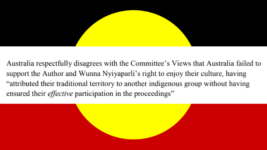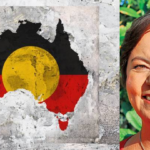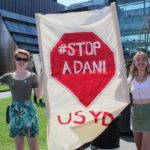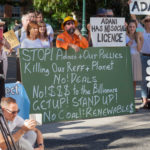Australia’s Committing Cultural Genocide Upon a First Peoples in Favour of Mining Interests

Australia has stonewalled the UN Human Rights Committee (CCPR), after it ordered the nation to provide “an effective and enforceable remedy” to the Wunna Nyiyaparli of Western Australia’s eastern Pilbara region in July 2023, in response to a complaint regarding having been barred from the court process that ultimately sought to establish their native title rights over Country.
In 2012, the Wunna Nyiyaparli lodged a native title claim over an area of land that sits within the region of the broader 1998 native title claim of the Nyiyaparli, the larger language group the Wunna Nyiyaparli are a part of.
The land of the Wunna Nyiyaparli sits within the Nyiyaparli claim, however under that agreement, the Wunna Nyiyaparli weren’t able to “speak for” or exercise their rights over their own Country.
Nyiyaparli and Wunna Nyiyaparli land is rich in iron ore, which is why Andrew ‘Twiggy’ Forrest’s Fortescue Metals operates Christmas Creek and Cloudbreak mines upon it, just as Gina Rinehart too runs the gigantic Roy Hill mine in that region.
The Wunna Nyiyaparli claim sought to curb mining expansion on their land, as under the preexisting 1998 Nyiyaparli native title claim further developments were threatening it.
Wunna Nyiyaparli elder Ailsa Roy lodged the CCPR complaint on 2 April 2019, following a July 2016 Federal Court hearing regarding Wunna Nyiyaparli heritage that had been so poorly communicated to the unrepresented Wunna Nyiyaparli people that three representatives who did attend court on the day were locked out of participating in a hearing that touched upon their very existence.
Yet, on being ordered to provide remedy to the Wunna Nyiyaparli people within 180 days, the Australian government then dragged its feet for 15 months before responding that it would do nothing of the sort, as despite the CCPR assessment, it considers that it was right in this instance.
Erasing a people to wipe out a claim
“Australia has a pattern of refusing to enforce decisions of the Human Rights Committee,” said Sydney-based lawyer Scott Calnan, whose been representing the Wunna Nyiyaparli. “But it has a particular flavour in this context given this government’s commitment to Indigenous rights, and the fact that they took the Voice forward.”
“It’s very disappointing that they don’t consider preventing an Indigenous people from being wiped out, completely destroyed, as an important issue that the UN committee had alerted it to and it can take action on,” the human rights lawyer told Sydney Criminal Lawyers.
The January 2012-lodged Wunna Nyiyaparli claim passed the initial registration test, as it was in accordance with the precepts of Western Desert traditional laws and customs. This test is contained within sections 190B and 190C of the Native Title Act 1993 (Cth). However, two Indigenous land use agreements (ILUAs) lodged in July 2012 under the Nyiyaparli claim disputed the Wunna Nyiyaparli claim.
The Federal Court ordered in late 2015 that the 2012 Wunna Nyiyaparli claim should be examined alongside the 1998 Nyiyaparli claim and further the court had decided to consider a second related question, which was whether the Wunna Nyiyaparli were really Nyiyaparli, despite their having already successfully passed the registration test that allowed them to lodge a native title claim.
Indeed, the Wunna Nyiyaparli were quite perplexed as to how this separate question had become a part of proceedings.
The Wunna Nyiyaparli’s original lawyers dropped the case in March 2016. This left them with no legal representation or ability to afford any. As they were living on Country, communications with the court became confused and messages weren’t even received. And this led to three Wunna Nyiyaparli attending court that year to argue native title, when the heritage issue was on the agenda.
So, in July 2016, as the Wunna Nyiyaparli trio weren’t prepared to argue heritage and even though they’d previously presented the court with documentation supporting their Nyiyaparli origin, Justice Richard White determined to proceed without their input, as they were unprepared. And in late 2016, the court found the Wunna Nyiyaparli aren’t Nyiyaparli, meaning their claim was void.
The CCPR determined in July last year that this process violated the cultural rights of the Wunna Nyiyaparli, under article 27 of the International Covenant on Civil and Political Rights (ICCPR), which protects the cultural rights of minority groups, including Indigenous peoples. The body further found their right to fair procedure, under article 14, has been infringed.
Colonial mindset
The remedy sought by the Wunna Nyiyaparli and agreed to by the CCPR was that Australia should provide the clan with the opportunity to go back to court and prove their native title, with legal representation, and any destruction to land in the interim be compensated. And the international rights body gave this country 180 days to resolve the matter.
However, the Attorney General’s Department found it necessary to request two extensions that saw it take 15 months to respond to the CCPR, and when its 24 October 2024 response was published, Australia told the respected body of international experts that it disagrees with the view that it failed to take measures to ensure the Wunna Nyiyaparli understood the proceedings and could participate.
“Australia submits that, in proceedings where the… Wunna Nyiyaparli were legally represented, it is reasonable to assume that, as represented litigants, they understood the nature and implications of the proceedings and, through their representing counsel, were thereby able to effectively participate in the proceedings,” Australia told the CCPR, implying that what it had done was good enough.
“The response doesn’t wash,” asserted Calnan. “The Wunna Nyiyaparli never had a chance to put on any submissions or any evidence. Clearly from the transcript, they did not understand what was going on. They thought it was an entirely different matter. They were thrown into some of the most complicated proceedings under Australian law in the Native Title Act without any representation.”
The Australian government seems to have missed the point, as the CCPR was ruling in regard to a settler colonial state not having properly informed a remote Aboriginal community about legal proceedings involving land rights, in a case where English was the respondents’ second language.
This was not about sending out an email to inform Anglo-Australians, whose mother tongue is English, about an administrative matter.
“I defy anybody to read the transcript of what went on and to think that the Wunna Nyiyaparli were fully informed and were able to effectively participate in the proceedings,” Calnan remarked. “It defies belief.”
Cultural genocide
Calnan is warning that this response from the government threatens the complete destruction of the Wunna Nyiyaparli as an Indigenous people. The CCPR assessment underscores that the identity of Indigenous people in general is intimately entwined with their land. And the Australian government response to the CCPR facilitates the destruction of the Wunna Nyiyaparli.
“The Wunna Nyiyaparli culture is inscribed on their land,” Calnan underscored. “Without the ability of the elders of the Wunna Nyiyaparli to take young people to their traditional Country, they can’t pass on their culture, without their ability to speak for the land, control it and look after it. This will destroy their culture outright.”
“The Wunna Nyiyaparli people can’t go and visit their Country,” he continued. “My client was taken to court for trespass. The West Australian police are apprehending Wunna Nyiyaparli even if they go onto their Country for a short-term visit. The effect of not being able to transmit their culture to future generations means that culture will die, and they will cease to exist as a people.”
According to the human rights lawyer, last year’s welcomed CCPR findings were significant as the nation was about to vote on the Voice referendum, and similarly, this decision reinforced the right of Indigenous peoples to receive fair procedure in regard to land rights, the committee had never deliberated on native title before, and the decision carved out a path for future such complaints.
But Calnan now adds that the significance of the Australian government refusal to produce remedies is being made in a very different political context, as the Voice referendum failed, the government has subsequently dumped its stated aim of advancing Aboriginal rights, while elsewhere on the planet, the Israeli state is perpetrating a colonial genocide upon the Palestinians of Gaza.
In assessing that the government’s stonewalling of the CCPR advice, the lawyer advised, it is not an act of genocide, as defined in the 1948 Genocide Convention, but it is representative of what is often referred to “cultural genocide”, which is not a standalone criminal offence.
“At the moment, there are large mines on Wunna Nyiyaparli land. Iron ore mines owned by Gina Rinehart and Twiggy Forrest,” said Calnan, getting to the issue underlying this case. “It would appear from the Australian government’s actions that they prioritise these millionaires making extra millions over preventing the complete destruction of Indigenous people inside Australia.”
The human rights lawyer added that “the ridiculous thing is, under native title, the Wunna Nyiyaparli couldn’t veto the mining anyway”.
Australia is notorious for ignoring the recommendations of the UN Human Rights Committee, despite its assessments being respected as highly authoritative on the international stage.
In the past, Canberra has declined to act on raising the age of criminal responsibility from 10 or to prohibit the detention of children in immigration centres, after the CCPR has recommended it do so.
But the key difference in the present case, as Calnan points out, is that the Wunna Nyiyaparli aren’t going to accept the denial of the CCPR ruling, as their very existence relies on being able to put their case to the Federal Court.
“The mining on that land is getting worse,” the legal professional made certain in concluding.
“The destruction of the sacred sites of their people, the graves of their ancestors, the land that marks out their songlines, is accelerating and getting worse. And they’re getting nothing from the government at all.”







